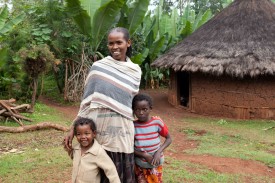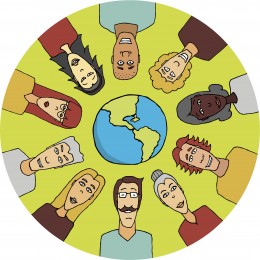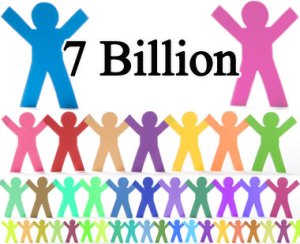 Aregash Ayele with two of her kids in Ethiopia.Photos: PAIHere’s a population angle you might not have considered: Family planning can help women adapt to climate change that’s already happening.
Aregash Ayele with two of her kids in Ethiopia.Photos: PAIHere’s a population angle you might not have considered: Family planning can help women adapt to climate change that’s already happening.
Population Action International has a new short film about this subject, Weathering Change, featuring mothers from Nepal, Peru, and Ethiopia. “When [women] have children every year, it hurts them,” says Ethiopian Aregash Ayele. “Due to climate change, mothers have understood that spacing their children is in their own best interest.”
Watch the trailer below, or the full 14-minute film here. And read more about Aregash Ayele beneath the video.
Aregash Ayele’s story, from PAI:
Deko Kebele, Ethiopia — Every morning, before the sun even rises over her rural Ethiopian village, 32-year-old Aregash Ayele gets up. While her six children sleep, she silently sweeps the dirt floor of her home and squats at a small fire, preparing the morning’s coffee and breakfast.
Soon, as sunlight trickles through cracks in the thatched roof, her family gathers in a semicircle around a communal plate and tiny cups full of steaming liquid. Her kids go to school, and she goes to chop firewood, carrying the heavy logs home on her back. She then walks more than an hour to the nearest source of clean drinking water. Aregash fills a yellow, 20-liter jerrican, straps it to her back with twine, and starts once more for home.
“A woman’s work is a lot. She doesn’t have a break from morning until night,” Aregash says. “She is always hurting for her kids, for her husband, and even herself. She carries everything on her back.”
At 1 p.m., her kids return from school for lunch. After feeding them, she heads to the farm to pick coffee or harvest enset, a root vegetable. She’ll take the coffee to the market in hopes of earning a little money to buy things she needs for dinner.
For Aregash and her family, life is more difficult than ever. Infrequent rain has caused a pond near her home to dry up, so she has to walk farther to get clean water. And changes in rainfall and other weather patterns have reduced harvests, resulting in less coffee to sell at the market, and less food for her family to eat. To make ends meet, her husband has taken work on another tract of land far from the village, leaving Aregash to manage their house, children, and farm on her own.
“It has never been like this,” she says. “It used to rain seasonally. Because it rained at the right time, we used to get our usual harvest. Now, because of climate change, the harvest has decreased and it’s affecting our livelihood.”
In many of the poorest areas of the world, shifting temperature and precipitation patterns are already affecting agricultural production and making scarce water supplies even more difficult to manage. The world’s growing population, which will surpass 7 billion people in October, is likely to magnify these challenges. Ethiopia, where Aregash lives, has doubled in population in the last 25 years, and could double again by 2050. This puts increasing demands for land, water, food, and fuel on communities and families that are already struggling.
Read more on population. Check out our series 7 Billion: What to expect when you're expanding
The coffee yields at Aregash’s farm have decreased by more than 80 percent during the last 10 years. At the same time, the prices of some staple foods have quadrupled at the market. She frequently goes without, subsisting on coffee to make it through her day.
She worries about the effects of all this on her children. “I’m feeding them with what I have, but I get really sad when they go hungry,” Aregash says. “If there are many children in a family, the food they eat is limited. But if women manage the number of kids they have …”
Her voice trails off for a few seconds. Then she brightens, finding her footing — and her voice as an unlikely advocate for family planning.
“For example, I have six children in my house, right? When I buy food for each, and give it to them, there will be none for me. And it’s not enough for my children … I tell mothers to use family planning and space their children. I tell them to use the three-months, three-years, or permanent protection so that they don’t have more children, so they can get out of poverty.”
Aregash finds time to volunteer at the local health clinic, distributing food aid to families in need, and teaching other mothers how to prevent pregnancy. In Ethiopia, the average woman has more than four children, and one-third of married women want to delay or stop childbearing but lack modern contraception. In Aregash’s community, where it is typical for a woman to have eight to 10 children, her efforts are being welcomed by women (and men) straining to care for the families they already have.
“Due to climate change, mothers have understood that using family planning and spacing their children is in their own best interest,” Aregash says. “A woman’s life is hard, and climate change is making it harder.”
She speaks from experience, because it is also her life.
Usually, by the time Aregash returns from the market each day, it is already dark. She starts a fire, and proceeds to cook dinner. Her family makes the same semicircle to eat, this time around a single, flickering candle.
Around 10 p.m., she puts her kids to sleep, and lays down on her own bed. Aregash closes her eyes. Before long, another day begins.
If you want to know more, read about Ethiopia’s ambitious family-planning program.
This is the latest in a series of Saturday GINK videos about population and reproduction (or a lack thereof). It’s also part of Grist’s 7 Billion series.



